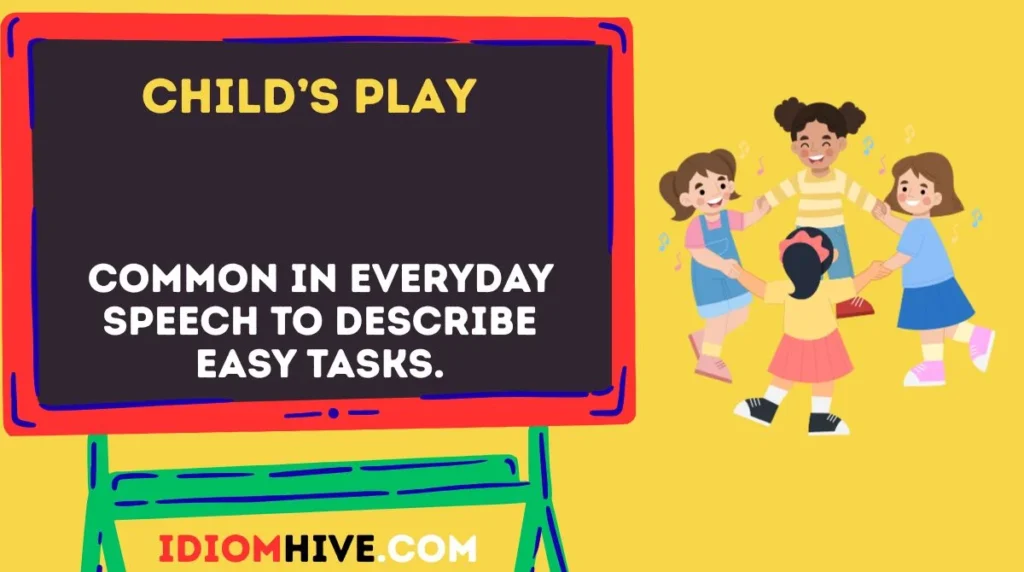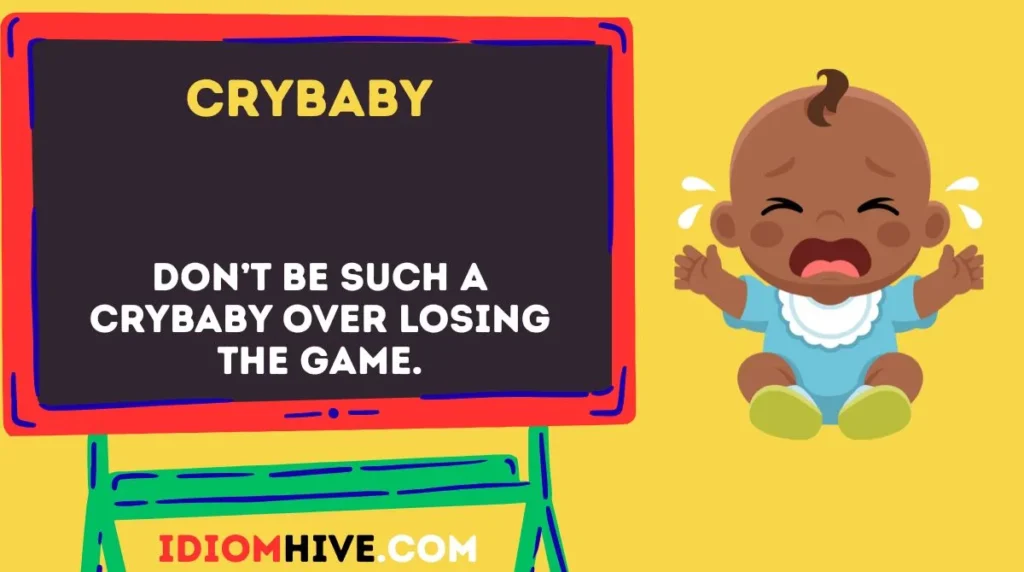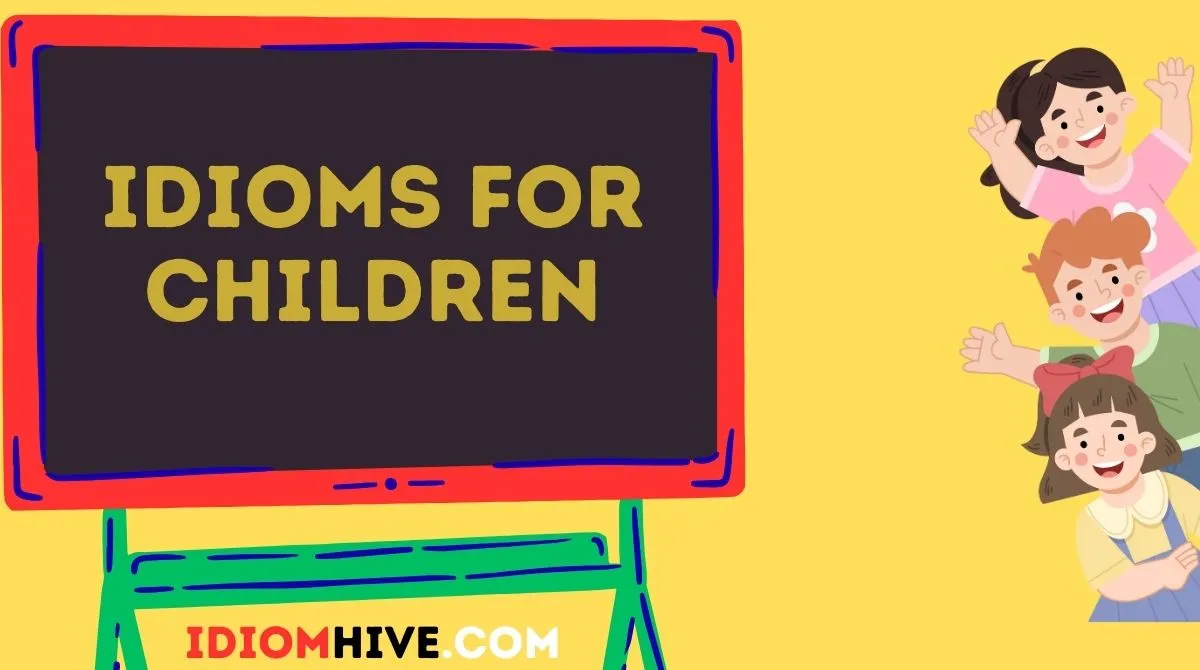Language is full of colorful expressions that go beyond the literal meaning of words. These expressions are called idioms. Idioms bring life to conversations, making them richer and more interesting.
Instead of saying something in a plain way, an idiom allows us to paint a picture with words. For children, learning idioms can be both fun and educational. They help young learners understand English culture, humor, and creativity while also improving vocabulary and communication skills.
Idioms for children are especially useful because they are easy to remember, often playful, and can make everyday conversations more exciting.
Whether used in stories, classroom lessons, or daily talks, these idioms teach kids how language can be both practical and imaginative. In this article, we will explore more than 46 idioms that are simple, fun, and child-friendly.
Did You Know?
The phrase “child’s play” itself is an idiom! It means something that is very easy to do. Many idioms we use today come from old fables, fairy tales, or nursery rhymes, which is why they connect so well with children.
Idioms About Childhood and Growing Up
Child’s Play

Meaning: Something very easy to do.
Example: Solving that puzzle was child’s play for her.
Similar Idiom: Easy as pie.
Note: Common in everyday speech to describe easy tasks.
Like a Kid in a Candy Store
Meaning: Very excited and happy.
Example: He was like a kid in a candy store when he saw all the new toys.
Similar Idiom: Over the moon.
Note: Informal, used for joy and excitement.
To Bring Up a Child
Meaning: To raise or nurture a child.
Example: She was brought up in a loving home.
Similar Idiom: Raise a child.
Note: Used in family and parenting conversations.
Throwing a Tantrum
Meaning: Acting upset or angry, like a child.
Example: The little boy started throwing a tantrum when he didn’t get ice cream.
Similar Idiom: Pitch a fit.
Note: Informal, often about young children.
Child at Heart
Meaning: An adult who enjoys things children like.
Example: Even at 40, he is still a child at heart when it comes to cartoons.
Similar Idiom: Young at heart.
Note: Often used positively about playful adults.
Spare the Rod, Spoil the Child
Meaning: Without discipline, children may become spoiled.
Example: The teacher believed in “spare the rod, spoil the child.”
Similar Idiom: Strict upbringing.
Note: Old-fashioned, used in parenting contexts.
Idioms About Learning and Curiosity
Eager Beaver
Meaning: A very eager or hardworking student.
Example: Sarah is an eager beaver who always finishes homework early.
Similar Idiom: Go-getter.
Note: Common in schools and classrooms.
ABCs of Something
Meaning: The basics or first lessons.
Example: The teacher explained the ABCs of painting.
Similar Idiom: The nuts and bolts.
Note: Used in teaching and learning.
To Learn the Ropes
Meaning: To understand how something works.
Example: He is still learning the ropes in his new school.
Similar Idiom: Get the hang of it.
Note: Common in both child and adult learning.
Curiosity Killed the Cat
Meaning: Being too curious can cause trouble.
Example: Don’t ask too many questions—curiosity killed the cat.
Similar Idiom: Don’t poke your nose in.
Note: Informal warning, used with children and adults.
Learn by Heart
Meaning: To memorize something.
Example: She learned the poem by heart.
Similar Idiom: Commit to memory.
Note: Very common in schools.
To Teach an Old Dog New Tricks
Meaning: Hard for older people to learn new things.
Example: Teaching grandma how to use a smartphone was like teaching an old dog new tricks.
Similar Idiom: Stuck in old ways.
Note: Often used humorously.
Idioms About Play and Fun
Monkey Business
Meaning: Mischief or naughty behavior.
Example: Stop the monkey business and finish your homework.
Similar Idiom: Horseplay.
Note: Informal, often for kids.
Fun and Games
Meaning: Playful activities.
Example: It’s all fun and games until someone gets hurt.
Similar Idiom: Just for laughs.
Note: Common in parenting and teaching.
All Work and No Play
Meaning: Too much work makes life boring.
Example: All work and no play makes Jack a dull boy.
Similar Idiom: Balance is key.
Note: Used for both children and adults.
Ring Around the Rosie
Meaning: A children’s circle game.
Example: The kids played ring around the rosie in the garden.
Similar Idiom: Nursery rhyme games.
Note: Associated with children’s songs and play.
Toy with an Idea
Meaning: To think about something without deciding.
Example: She is toying with the idea of starting ballet lessons.
Similar Idiom: Play with the thought.
Note: Daily life usage.
Jump for Joy
Meaning: Extremely happy.
Example: The child jumped for joy when he saw the puppy.
Similar Idiom: Burst with happiness.
Note: Informal, joyful situations.
Make Believe
Meaning: Pretend play.
Example: The children love to make believe they are pirates.
Similar Idiom: Play pretend.
Note: Very common in childhood play.
Idioms About Behavior and Manners
Out of the Mouths of Babes
Meaning: Children sometimes say wise or true things.
Example: Out of the mouths of babes came a very smart answer.
Similar Idiom: Childlike wisdom.
Note: Positive, often used humorously.
Act Your Age
Meaning: Stop acting childish.
Example: Stop throwing things and act your age!
Similar Idiom: Grow up.
Note: Often used by adults toward kids.
Born Yesterday
Meaning: Naïve or easily fooled.
Example: Don’t trick me—I wasn’t born yesterday.
Similar Idiom: Wet behind the ears.
Note: Informal, playful or serious.
Crybaby

Meaning: Someone who cries too easily.
Example: Don’t be such a crybaby over losing the game.
Similar Idiom: Spoiled brat.
Note: Informal, sometimes teasing.
Playground Politics
Meaning: Childish behavior in serious matters.
Example: The argument in the office felt like playground politics.
Similar Idiom: Petty arguments.
Note: Informal, often about adults.
Naughty but Nice
Meaning: Mischievous but still likable.
Example: The boy is naughty but nice at heart.
Similar Idiom: Lovable rascal.
Note: Informal, affectionate description.
Goody Two-Shoes
Meaning: A person who always follows rules.
Example: She never breaks the rules; she’s a real goody two-shoes.
Similar Idiom: Teacher’s pet.
Note: Informal, sometimes teasing.
Wet Behind the Ears
Meaning: Inexperienced or young.
Example: The new student is still wet behind the ears.
Similar Idiom: Greenhorn.
Note: Informal, often playful.
How to Use These Idioms in Daily Life
Idioms for children are perfect for making language fun and engaging. Here’s how they can be used:
- Speaking: Use idioms in conversations with children to make ideas easier to understand. For example, say “all work and no play” when encouraging balance between study and fun.
- Writing: Teachers and parents can include idioms in stories, homework, and reading exercises to help children learn naturally.
- Professional usage: Educators, writers, and child counselors often use idioms to explain complex ideas in simple, child-friendly ways.
Common Mistakes Learners Make With Idioms
- Wrong literal meaning:
❌ “He was child’s play.”
✅ “Solving the puzzle was child’s play.” - Mixing idioms:
❌ “Like a kid in the pie.”
✅ “Like a kid in a candy store.” - Overusing idioms:
Idioms should support, not replace, natural speech. Using too many can confuse listeners.
FAQs
Q1: Why should children learn idioms?
Idioms help children understand creative language and improve both speaking and listening skills.
Q2: Are idioms formal or informal?
Most idioms are informal, but some are suitable for school, literature, and even professional communication.
Q3: Can idioms confuse children?
Yes, if explained literally. That’s why it’s best to give examples and context.
Q4: How many idioms should a child learn?
Start small—10 to 15 idioms at a time. Over time, children can easily learn dozens.
Q5: Do all cultures use idioms?
Yes, every language has idioms, though they differ from culture to culture.
Conclusion
Idioms are the playful side of language. For children, they open doors to imagination, fun, and a deeper understanding of English.
Whether describing mischief with “monkey business,” happiness with “jump for joy,” or learning with “ABCs of something,” idioms make communication brighter and more colorful.
By introducing idioms early, we not only build stronger language skills but also give children a tool to enjoy and express themselves in a creative way.
So, start using idioms in conversations, and let children experience the magic of words in action.










